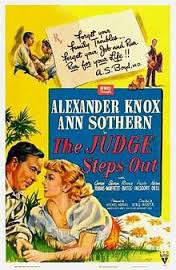
THE JUDGE STEPS OUT
US, 1947, 91 minutes, Black and white.
Alexander Knox, Ann Southern, George Tobias, Sharyn Moffett, Ian Wolfe, Florence Bates, Frieda Inescourt, Myrna Dell, in, H.B.Warner, Martha Hyer.
Directed by Boris Ingster.
The screenplay for this film, on a film from RKO with a strong cast, is both serious and comic. It is based on a story by the director, Boris Ingster, who had directed The Stranger on the Third Floor, made only one more feature film but worked in television. He and star, Alexander Knox, wrote the screenplay, a vehicle for Knox.
He portrays a judge in Boston, stifled by its stuffiness, by his very proper wife, Frieda Inescourt, giving money to his daughter who is to about to marry into a wealthy family. He is supported by the man in charge of his office, played by Ian Wolfe. He gives a legally correct but emotionally wrong decision in a custody case. When offered a lobbying job in Washington, he agrees to go to investigate but, feels stomach problems on the way, calls into a local doctor, who has a drinking habit, who gives some good advice to forget everyone and everything. He goes fishing with the doctor, plans to go back home, but misses his train and travels to California where he thumbs lifts, meets an agreeable young orphan, encounters the manager of a diner, gets into some trouble but stays to work with her. All goes well, everybody thinking he had disappeared, but he is concerned when the local judge gives a similarly severe judgement about the custody of an orphan. Ann Sothern, only two years younger than Knox, is engaging as the manager of the diner.
The film was made in 1947 and, though there are divorce sequences, the expectation of the Motion Picture Code is that people stay together – portrayed convincingly and heroically when the judge returns, intervenes in the previous judgement, where there is an appeal because of his alleged prejudice against the mother; he is congratulated and offered a higher position in accordance with his skills. The owner of the diner travels to Boston but realises that his life is there and in the law, and she returns home, happy that she can adopt the orphan.
One point of interest is to see Florence Bates in a very sympathetic role, Hispanic accent and all – rather than the very haughty dames she so often portrayed.
1. An agreeable drama with touches of comedy? The moral values of the postwar era? Marriage, failures in marriage, love, performance, re-marriage? Careers?
2. The Boston setting, black and white photography, homes, society, the courts? The jokes about Boston being stuffy? The contrast with California, the desert, the diner, the friendly people? Los Angeles, the judge? The musical score?
3. The title, the focus on Tom, his age, marriage, his daughter, the tension with his wife and her interest in society, his daughter becoming engaged to the wealthy man, their wanting money from him, forgetting his birthday? At court, Hector and his continued loyalty, the birthday gift, the judges singing greetings? His getting the difficult case? Hearing the sides, his dislike of the showgirl widow, her husband killed in the war effort, his father wanting custody of the child to give it every benefit? Her grief at the decision?
4. The wedding, the reception, his drinking, the discussion with the father-in-law, the need for a lawyer, a career path, stock and benefits? His wife wanting him to accept? His thinking about it, on the way to Washington to investigate?
5. His physical pains, going to the doctor, the friendly doctor and his drinking problem? Probing, the pains, the diagnosis, the advice to let everything go? The fishing? The two going fishing, happy discussions? Tom forgetting to send the telegram? Continuing on, the doctor tearing up the telegram, listening to people on the train talking about his potential job?
6. The decision to step out, and finding his way, talking with Nan, discussing books, the introduction to Peggy, the accusation that he was stealing, Peggy saving him, Chita and taking the five dollars? His return, the invitation to stay, his becoming a short order cook, enjoying the relaxation, talking with the customers, telling stories?
7. Mike attracted to Peggy, calling the Sheriff, Tom thinking he was exposed – but being asked return on the books?
8. Falling in love with Peggy, taking her to the restaurant, then not staying? The new suit? Going bowling? Talking, falling in love? Peggy’s story, the rash marriage, the divorce, the loss of her child, wanting to adopt? The birthday party, Nan not coming, Peggy’s response, the children?
9. Chita, Hispanic, her accent, friend, good advice, working, understanding Tom?
10. The upset for Peggy, Tom and his providing the documents, going to see the judge, being advised to get help for his drinking, the decision against Peggy having the girl?
11. His telling the truth, his having to return, deciding to go, back in Boston, received by his wife, his daughter and her disowned husband, his art? His cold, Hector, studying the books, wanting to intervene, the talk about prejudice, his going to the judges, some judges reacting against ? The chief Justice and his interest, enthusiasm, winning the case? Becoming famous?
12. The judge in California, and admiring Tom, custody for Peggy? The phone calls, the flying to Boston, his meeting, the discussion about his future, her self-sacrifice, that Tom was in the right place, his legal work?
13. Happy ending, self-sacrificing ending?